Organisational Behaviour Report: Primark and Employee Behaviour
VerifiedAdded on 2023/01/13
|13
|4543
|29
Report
AI Summary
This report offers a comprehensive analysis of organisational behaviour, focusing on the case of Primark. It delves into the influence of culture, power, and politics on employee behaviour, examining how these factors shape the work environment and impact performance. The report explores motivational theories, including Maslow's hierarchy of needs and goal-setting theory, and their application within Primark to enhance employee engagement and productivity. Furthermore, it differentiates between effective and ineffective team dynamics, highlighting key characteristics and strategies for fostering successful teamwork. The report also provides insights into the concepts and philosophies of organisational behaviour, offering a holistic understanding of the subject matter. By examining these aspects, the report aims to provide a practical understanding of how organisational behaviour principles can be applied to improve business outcomes within Primark.
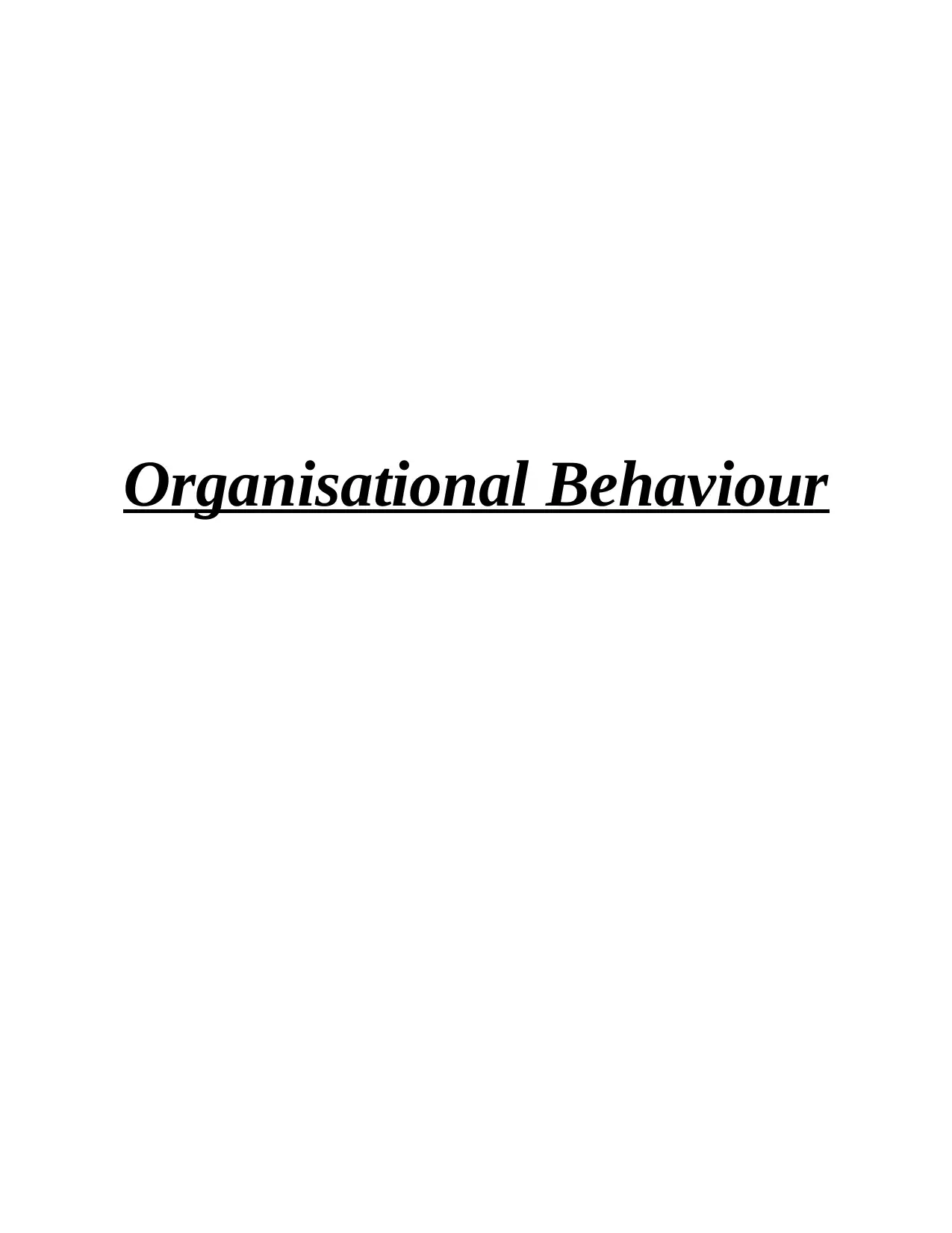
Organisational Behaviour
Paraphrase This Document
Need a fresh take? Get an instant paraphrase of this document with our AI Paraphraser
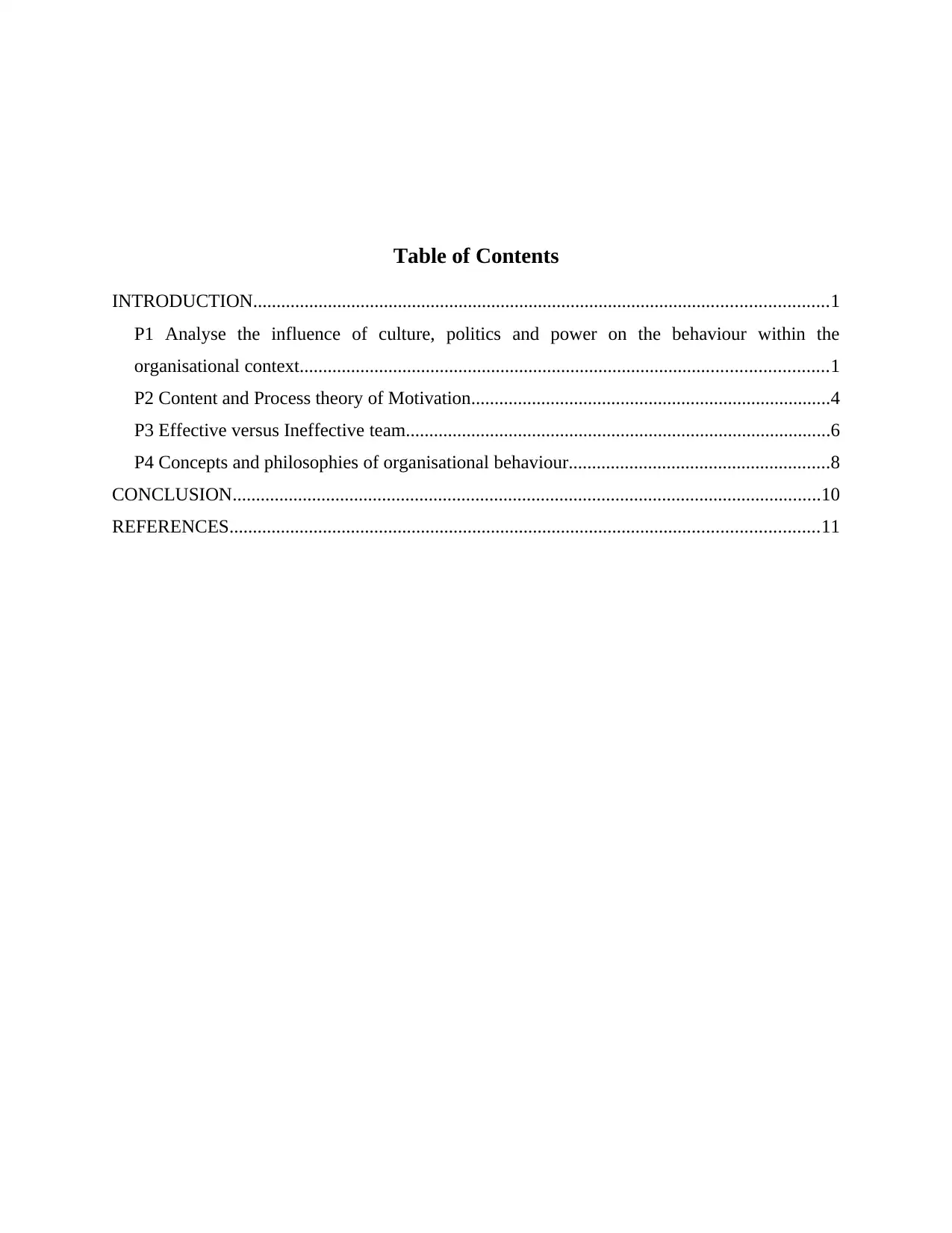
Table of Contents
INTRODUCTION...........................................................................................................................1
P1 Analyse the influence of culture, politics and power on the behaviour within the
organisational context.................................................................................................................1
P2 Content and Process theory of Motivation.............................................................................4
P3 Effective versus Ineffective team...........................................................................................6
P4 Concepts and philosophies of organisational behaviour........................................................8
CONCLUSION..............................................................................................................................10
REFERENCES..............................................................................................................................11
INTRODUCTION...........................................................................................................................1
P1 Analyse the influence of culture, politics and power on the behaviour within the
organisational context.................................................................................................................1
P2 Content and Process theory of Motivation.............................................................................4
P3 Effective versus Ineffective team...........................................................................................6
P4 Concepts and philosophies of organisational behaviour........................................................8
CONCLUSION..............................................................................................................................10
REFERENCES..............................................................................................................................11
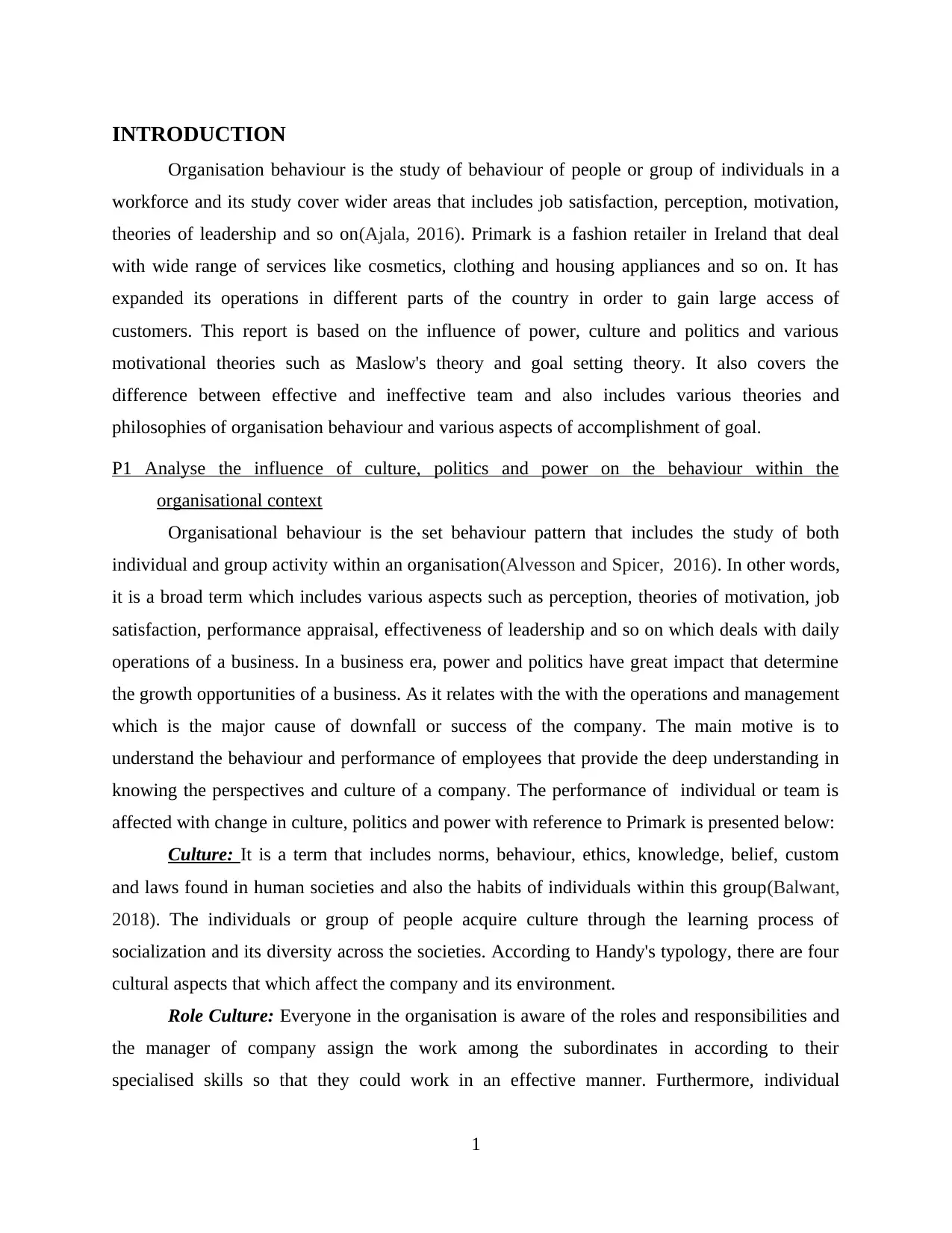
INTRODUCTION
Organisation behaviour is the study of behaviour of people or group of individuals in a
workforce and its study cover wider areas that includes job satisfaction, perception, motivation,
theories of leadership and so on(Ajala, 2016). Primark is a fashion retailer in Ireland that deal
with wide range of services like cosmetics, clothing and housing appliances and so on. It has
expanded its operations in different parts of the country in order to gain large access of
customers. This report is based on the influence of power, culture and politics and various
motivational theories such as Maslow's theory and goal setting theory. It also covers the
difference between effective and ineffective team and also includes various theories and
philosophies of organisation behaviour and various aspects of accomplishment of goal.
P1 Analyse the influence of culture, politics and power on the behaviour within the
organisational context
Organisational behaviour is the set behaviour pattern that includes the study of both
individual and group activity within an organisation(Alvesson and Spicer, 2016). In other words,
it is a broad term which includes various aspects such as perception, theories of motivation, job
satisfaction, performance appraisal, effectiveness of leadership and so on which deals with daily
operations of a business. In a business era, power and politics have great impact that determine
the growth opportunities of a business. As it relates with the with the operations and management
which is the major cause of downfall or success of the company. The main motive is to
understand the behaviour and performance of employees that provide the deep understanding in
knowing the perspectives and culture of a company. The performance of individual or team is
affected with change in culture, politics and power with reference to Primark is presented below:
Culture: It is a term that includes norms, behaviour, ethics, knowledge, belief, custom
and laws found in human societies and also the habits of individuals within this group(Balwant,
2018). The individuals or group of people acquire culture through the learning process of
socialization and its diversity across the societies. According to Handy's typology, there are four
cultural aspects that which affect the company and its environment.
Role Culture: Everyone in the organisation is aware of the roles and responsibilities and
the manager of company assign the work among the subordinates in according to their
specialised skills so that they could work in an effective manner. Furthermore, individual
1
Organisation behaviour is the study of behaviour of people or group of individuals in a
workforce and its study cover wider areas that includes job satisfaction, perception, motivation,
theories of leadership and so on(Ajala, 2016). Primark is a fashion retailer in Ireland that deal
with wide range of services like cosmetics, clothing and housing appliances and so on. It has
expanded its operations in different parts of the country in order to gain large access of
customers. This report is based on the influence of power, culture and politics and various
motivational theories such as Maslow's theory and goal setting theory. It also covers the
difference between effective and ineffective team and also includes various theories and
philosophies of organisation behaviour and various aspects of accomplishment of goal.
P1 Analyse the influence of culture, politics and power on the behaviour within the
organisational context
Organisational behaviour is the set behaviour pattern that includes the study of both
individual and group activity within an organisation(Alvesson and Spicer, 2016). In other words,
it is a broad term which includes various aspects such as perception, theories of motivation, job
satisfaction, performance appraisal, effectiveness of leadership and so on which deals with daily
operations of a business. In a business era, power and politics have great impact that determine
the growth opportunities of a business. As it relates with the with the operations and management
which is the major cause of downfall or success of the company. The main motive is to
understand the behaviour and performance of employees that provide the deep understanding in
knowing the perspectives and culture of a company. The performance of individual or team is
affected with change in culture, politics and power with reference to Primark is presented below:
Culture: It is a term that includes norms, behaviour, ethics, knowledge, belief, custom
and laws found in human societies and also the habits of individuals within this group(Balwant,
2018). The individuals or group of people acquire culture through the learning process of
socialization and its diversity across the societies. According to Handy's typology, there are four
cultural aspects that which affect the company and its environment.
Role Culture: Everyone in the organisation is aware of the roles and responsibilities and
the manager of company assign the work among the subordinates in according to their
specialised skills so that they could work in an effective manner. Furthermore, individual
1
⊘ This is a preview!⊘
Do you want full access?
Subscribe today to unlock all pages.

Trusted by 1+ million students worldwide
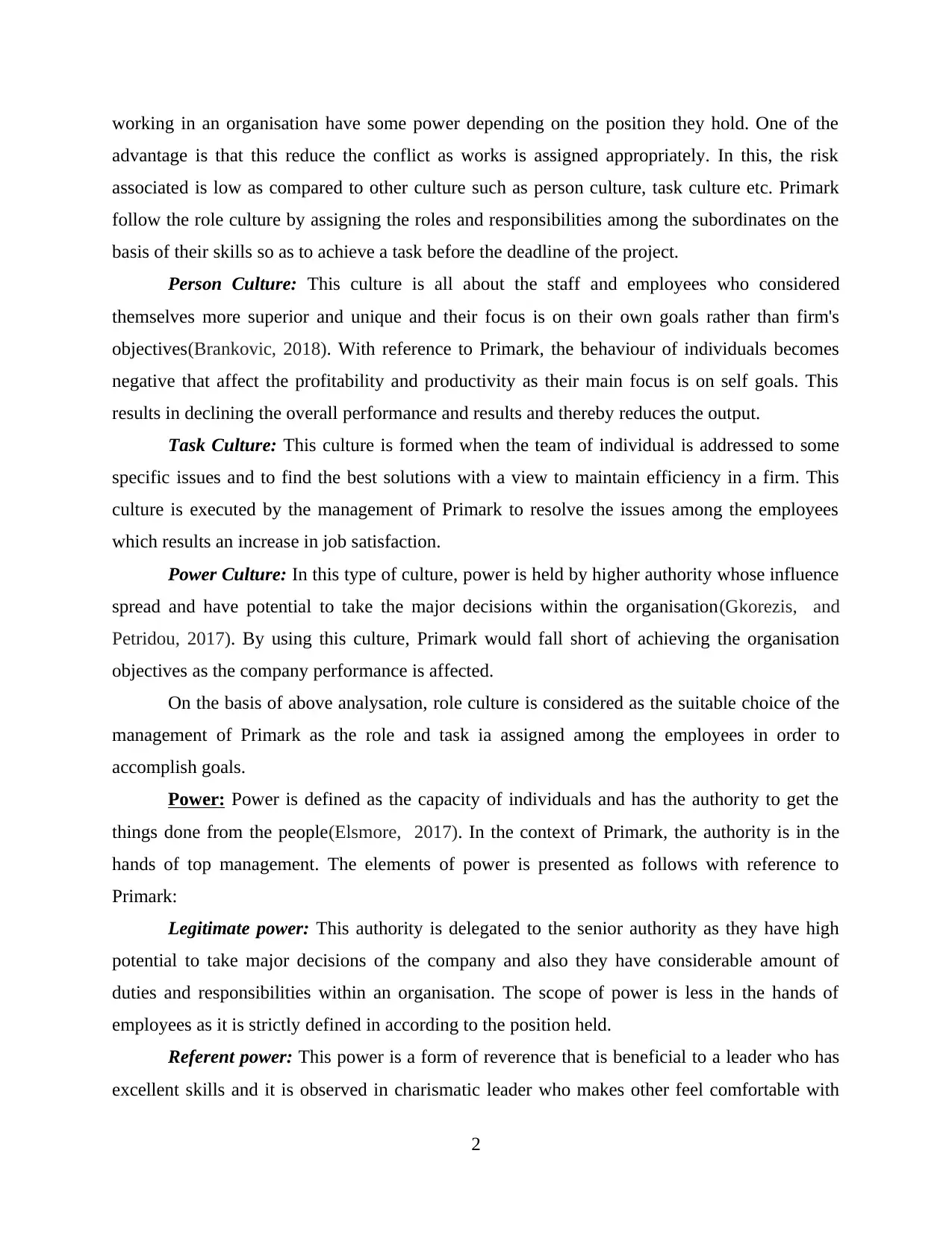
working in an organisation have some power depending on the position they hold. One of the
advantage is that this reduce the conflict as works is assigned appropriately. In this, the risk
associated is low as compared to other culture such as person culture, task culture etc. Primark
follow the role culture by assigning the roles and responsibilities among the subordinates on the
basis of their skills so as to achieve a task before the deadline of the project.
Person Culture: This culture is all about the staff and employees who considered
themselves more superior and unique and their focus is on their own goals rather than firm's
objectives(Brankovic, 2018). With reference to Primark, the behaviour of individuals becomes
negative that affect the profitability and productivity as their main focus is on self goals. This
results in declining the overall performance and results and thereby reduces the output.
Task Culture: This culture is formed when the team of individual is addressed to some
specific issues and to find the best solutions with a view to maintain efficiency in a firm. This
culture is executed by the management of Primark to resolve the issues among the employees
which results an increase in job satisfaction.
Power Culture: In this type of culture, power is held by higher authority whose influence
spread and have potential to take the major decisions within the organisation(Gkorezis, and
Petridou, 2017). By using this culture, Primark would fall short of achieving the organisation
objectives as the company performance is affected.
On the basis of above analysation, role culture is considered as the suitable choice of the
management of Primark as the role and task ia assigned among the employees in order to
accomplish goals.
Power: Power is defined as the capacity of individuals and has the authority to get the
things done from the people(Elsmore, 2017). In the context of Primark, the authority is in the
hands of top management. The elements of power is presented as follows with reference to
Primark:
Legitimate power: This authority is delegated to the senior authority as they have high
potential to take major decisions of the company and also they have considerable amount of
duties and responsibilities within an organisation. The scope of power is less in the hands of
employees as it is strictly defined in according to the position held.
Referent power: This power is a form of reverence that is beneficial to a leader who has
excellent skills and it is observed in charismatic leader who makes other feel comfortable with
2
advantage is that this reduce the conflict as works is assigned appropriately. In this, the risk
associated is low as compared to other culture such as person culture, task culture etc. Primark
follow the role culture by assigning the roles and responsibilities among the subordinates on the
basis of their skills so as to achieve a task before the deadline of the project.
Person Culture: This culture is all about the staff and employees who considered
themselves more superior and unique and their focus is on their own goals rather than firm's
objectives(Brankovic, 2018). With reference to Primark, the behaviour of individuals becomes
negative that affect the profitability and productivity as their main focus is on self goals. This
results in declining the overall performance and results and thereby reduces the output.
Task Culture: This culture is formed when the team of individual is addressed to some
specific issues and to find the best solutions with a view to maintain efficiency in a firm. This
culture is executed by the management of Primark to resolve the issues among the employees
which results an increase in job satisfaction.
Power Culture: In this type of culture, power is held by higher authority whose influence
spread and have potential to take the major decisions within the organisation(Gkorezis, and
Petridou, 2017). By using this culture, Primark would fall short of achieving the organisation
objectives as the company performance is affected.
On the basis of above analysation, role culture is considered as the suitable choice of the
management of Primark as the role and task ia assigned among the employees in order to
accomplish goals.
Power: Power is defined as the capacity of individuals and has the authority to get the
things done from the people(Elsmore, 2017). In the context of Primark, the authority is in the
hands of top management. The elements of power is presented as follows with reference to
Primark:
Legitimate power: This authority is delegated to the senior authority as they have high
potential to take major decisions of the company and also they have considerable amount of
duties and responsibilities within an organisation. The scope of power is less in the hands of
employees as it is strictly defined in according to the position held.
Referent power: This power is a form of reverence that is beneficial to a leader who has
excellent skills and it is observed in charismatic leader who makes other feel comfortable with
2
Paraphrase This Document
Need a fresh take? Get an instant paraphrase of this document with our AI Paraphraser
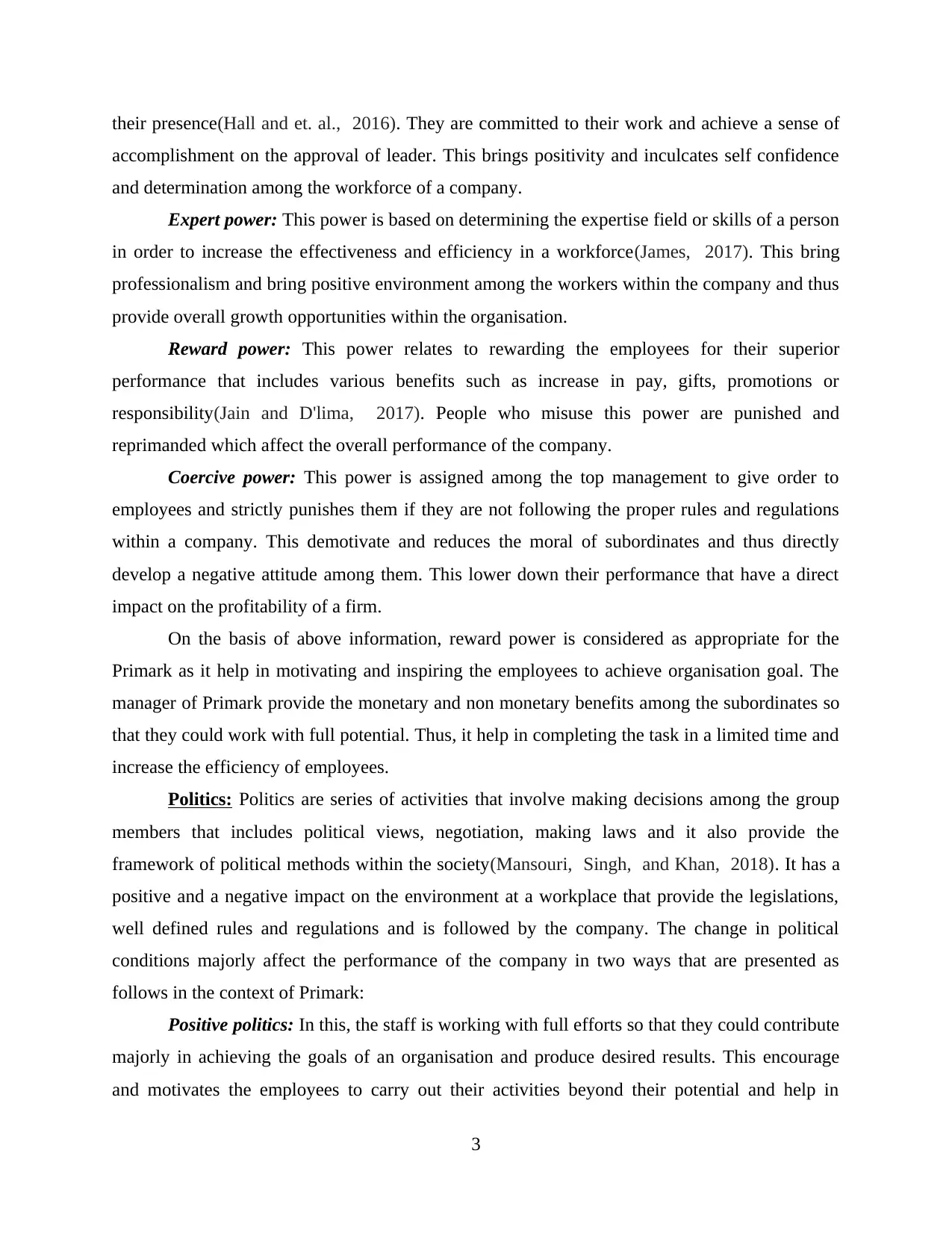
their presence(Hall and et. al., 2016). They are committed to their work and achieve a sense of
accomplishment on the approval of leader. This brings positivity and inculcates self confidence
and determination among the workforce of a company.
Expert power: This power is based on determining the expertise field or skills of a person
in order to increase the effectiveness and efficiency in a workforce(James, 2017). This bring
professionalism and bring positive environment among the workers within the company and thus
provide overall growth opportunities within the organisation.
Reward power: This power relates to rewarding the employees for their superior
performance that includes various benefits such as increase in pay, gifts, promotions or
responsibility(Jain and D'lima, 2017). People who misuse this power are punished and
reprimanded which affect the overall performance of the company.
Coercive power: This power is assigned among the top management to give order to
employees and strictly punishes them if they are not following the proper rules and regulations
within a company. This demotivate and reduces the moral of subordinates and thus directly
develop a negative attitude among them. This lower down their performance that have a direct
impact on the profitability of a firm.
On the basis of above information, reward power is considered as appropriate for the
Primark as it help in motivating and inspiring the employees to achieve organisation goal. The
manager of Primark provide the monetary and non monetary benefits among the subordinates so
that they could work with full potential. Thus, it help in completing the task in a limited time and
increase the efficiency of employees.
Politics: Politics are series of activities that involve making decisions among the group
members that includes political views, negotiation, making laws and it also provide the
framework of political methods within the society(Mansouri, Singh, and Khan, 2018). It has a
positive and a negative impact on the environment at a workplace that provide the legislations,
well defined rules and regulations and is followed by the company. The change in political
conditions majorly affect the performance of the company in two ways that are presented as
follows in the context of Primark:
Positive politics: In this, the staff is working with full efforts so that they could contribute
majorly in achieving the goals of an organisation and produce desired results. This encourage
and motivates the employees to carry out their activities beyond their potential and help in
3
accomplishment on the approval of leader. This brings positivity and inculcates self confidence
and determination among the workforce of a company.
Expert power: This power is based on determining the expertise field or skills of a person
in order to increase the effectiveness and efficiency in a workforce(James, 2017). This bring
professionalism and bring positive environment among the workers within the company and thus
provide overall growth opportunities within the organisation.
Reward power: This power relates to rewarding the employees for their superior
performance that includes various benefits such as increase in pay, gifts, promotions or
responsibility(Jain and D'lima, 2017). People who misuse this power are punished and
reprimanded which affect the overall performance of the company.
Coercive power: This power is assigned among the top management to give order to
employees and strictly punishes them if they are not following the proper rules and regulations
within a company. This demotivate and reduces the moral of subordinates and thus directly
develop a negative attitude among them. This lower down their performance that have a direct
impact on the profitability of a firm.
On the basis of above information, reward power is considered as appropriate for the
Primark as it help in motivating and inspiring the employees to achieve organisation goal. The
manager of Primark provide the monetary and non monetary benefits among the subordinates so
that they could work with full potential. Thus, it help in completing the task in a limited time and
increase the efficiency of employees.
Politics: Politics are series of activities that involve making decisions among the group
members that includes political views, negotiation, making laws and it also provide the
framework of political methods within the society(Mansouri, Singh, and Khan, 2018). It has a
positive and a negative impact on the environment at a workplace that provide the legislations,
well defined rules and regulations and is followed by the company. The change in political
conditions majorly affect the performance of the company in two ways that are presented as
follows in the context of Primark:
Positive politics: In this, the staff is working with full efforts so that they could contribute
majorly in achieving the goals of an organisation and produce desired results. This encourage
and motivates the employees to carry out their activities beyond their potential and help in
3
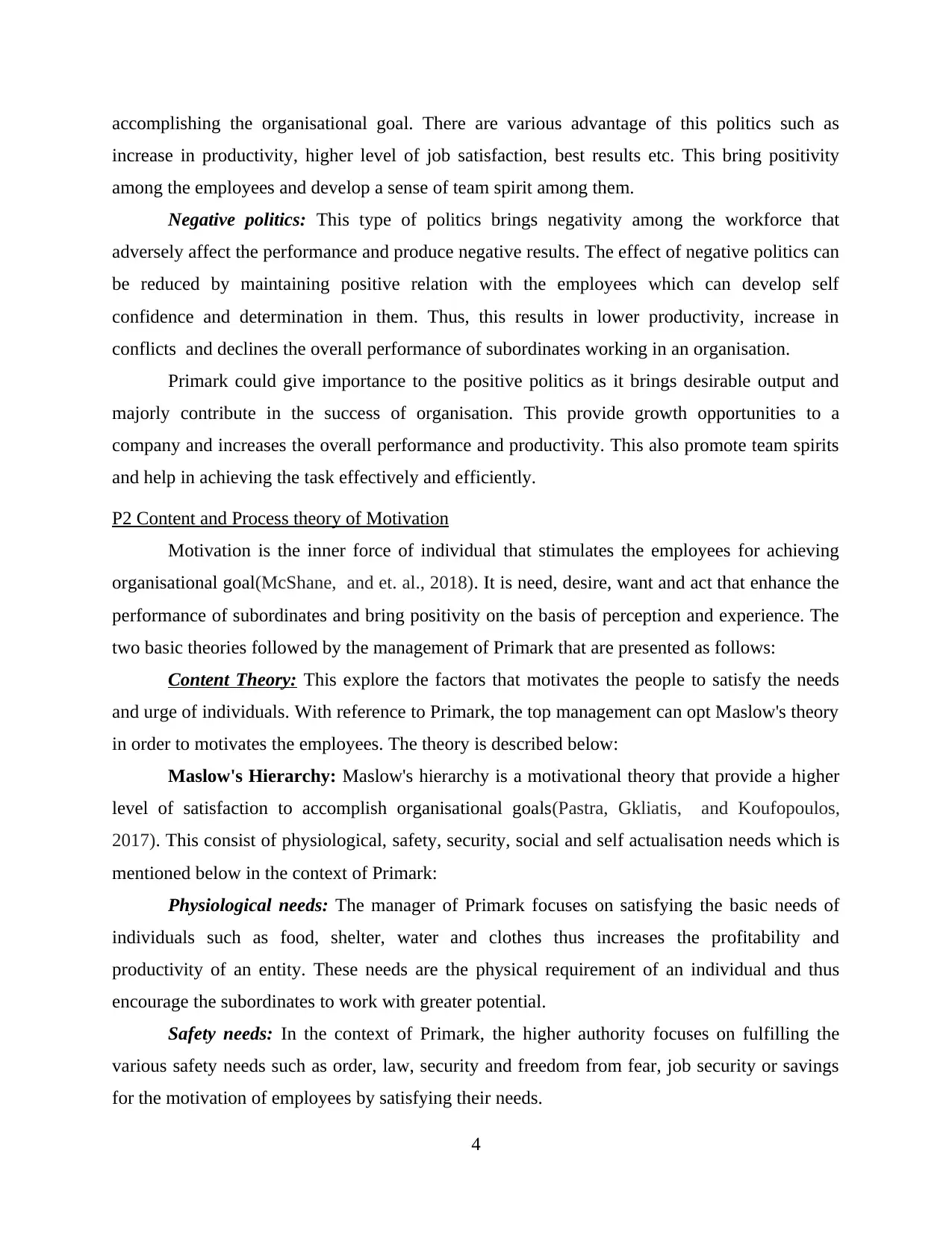
accomplishing the organisational goal. There are various advantage of this politics such as
increase in productivity, higher level of job satisfaction, best results etc. This bring positivity
among the employees and develop a sense of team spirit among them.
Negative politics: This type of politics brings negativity among the workforce that
adversely affect the performance and produce negative results. The effect of negative politics can
be reduced by maintaining positive relation with the employees which can develop self
confidence and determination in them. Thus, this results in lower productivity, increase in
conflicts and declines the overall performance of subordinates working in an organisation.
Primark could give importance to the positive politics as it brings desirable output and
majorly contribute in the success of organisation. This provide growth opportunities to a
company and increases the overall performance and productivity. This also promote team spirits
and help in achieving the task effectively and efficiently.
P2 Content and Process theory of Motivation
Motivation is the inner force of individual that stimulates the employees for achieving
organisational goal(McShane, and et. al., 2018). It is need, desire, want and act that enhance the
performance of subordinates and bring positivity on the basis of perception and experience. The
two basic theories followed by the management of Primark that are presented as follows:
Content Theory: This explore the factors that motivates the people to satisfy the needs
and urge of individuals. With reference to Primark, the top management can opt Maslow's theory
in order to motivates the employees. The theory is described below:
Maslow's Hierarchy: Maslow's hierarchy is a motivational theory that provide a higher
level of satisfaction to accomplish organisational goals(Pastra, Gkliatis, and Koufopoulos,
2017). This consist of physiological, safety, security, social and self actualisation needs which is
mentioned below in the context of Primark:
Physiological needs: The manager of Primark focuses on satisfying the basic needs of
individuals such as food, shelter, water and clothes thus increases the profitability and
productivity of an entity. These needs are the physical requirement of an individual and thus
encourage the subordinates to work with greater potential.
Safety needs: In the context of Primark, the higher authority focuses on fulfilling the
various safety needs such as order, law, security and freedom from fear, job security or savings
for the motivation of employees by satisfying their needs.
4
increase in productivity, higher level of job satisfaction, best results etc. This bring positivity
among the employees and develop a sense of team spirit among them.
Negative politics: This type of politics brings negativity among the workforce that
adversely affect the performance and produce negative results. The effect of negative politics can
be reduced by maintaining positive relation with the employees which can develop self
confidence and determination in them. Thus, this results in lower productivity, increase in
conflicts and declines the overall performance of subordinates working in an organisation.
Primark could give importance to the positive politics as it brings desirable output and
majorly contribute in the success of organisation. This provide growth opportunities to a
company and increases the overall performance and productivity. This also promote team spirits
and help in achieving the task effectively and efficiently.
P2 Content and Process theory of Motivation
Motivation is the inner force of individual that stimulates the employees for achieving
organisational goal(McShane, and et. al., 2018). It is need, desire, want and act that enhance the
performance of subordinates and bring positivity on the basis of perception and experience. The
two basic theories followed by the management of Primark that are presented as follows:
Content Theory: This explore the factors that motivates the people to satisfy the needs
and urge of individuals. With reference to Primark, the top management can opt Maslow's theory
in order to motivates the employees. The theory is described below:
Maslow's Hierarchy: Maslow's hierarchy is a motivational theory that provide a higher
level of satisfaction to accomplish organisational goals(Pastra, Gkliatis, and Koufopoulos,
2017). This consist of physiological, safety, security, social and self actualisation needs which is
mentioned below in the context of Primark:
Physiological needs: The manager of Primark focuses on satisfying the basic needs of
individuals such as food, shelter, water and clothes thus increases the profitability and
productivity of an entity. These needs are the physical requirement of an individual and thus
encourage the subordinates to work with greater potential.
Safety needs: In the context of Primark, the higher authority focuses on fulfilling the
various safety needs such as order, law, security and freedom from fear, job security or savings
for the motivation of employees by satisfying their needs.
4
⊘ This is a preview!⊘
Do you want full access?
Subscribe today to unlock all pages.

Trusted by 1+ million students worldwide
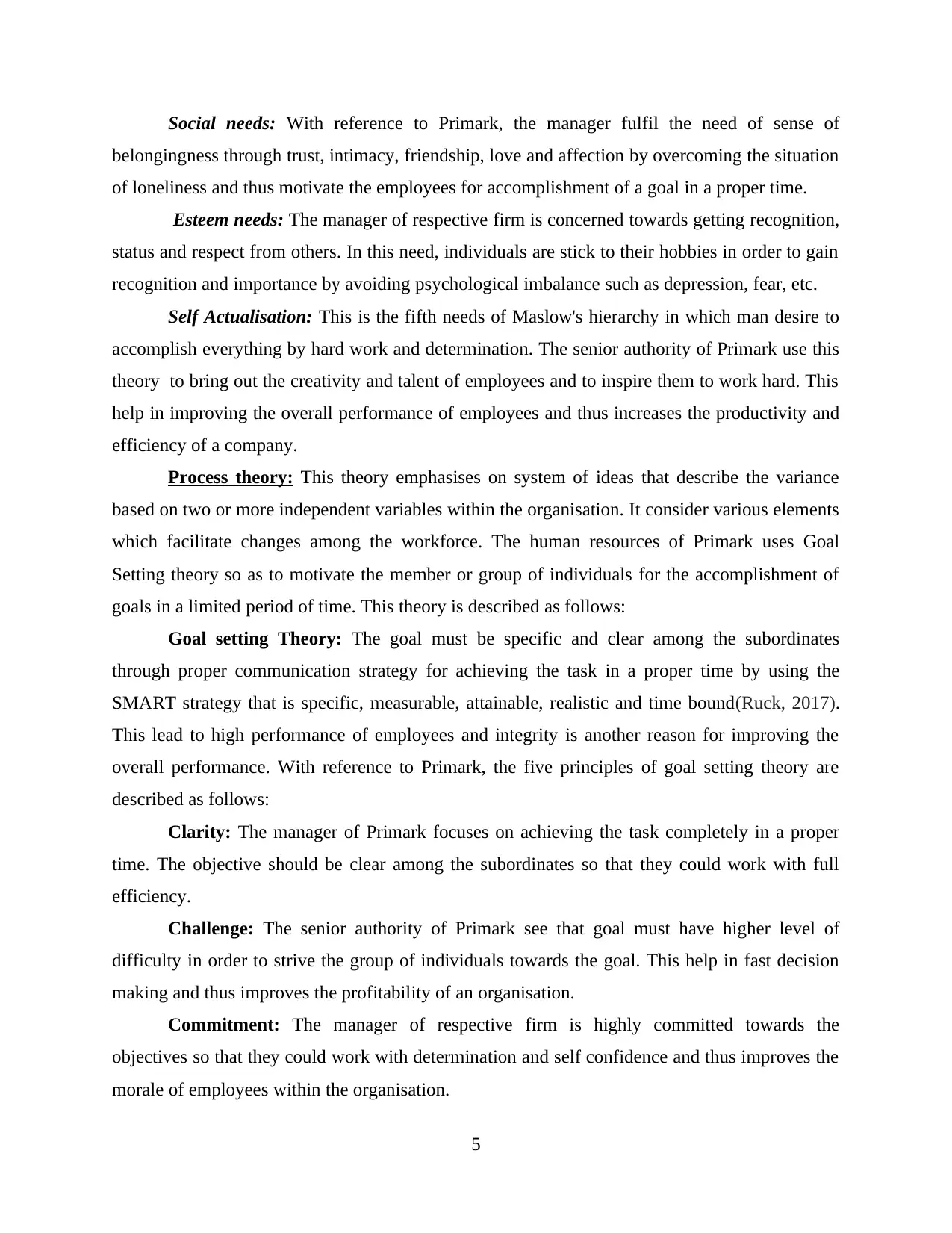
Social needs: With reference to Primark, the manager fulfil the need of sense of
belongingness through trust, intimacy, friendship, love and affection by overcoming the situation
of loneliness and thus motivate the employees for accomplishment of a goal in a proper time.
Esteem needs: The manager of respective firm is concerned towards getting recognition,
status and respect from others. In this need, individuals are stick to their hobbies in order to gain
recognition and importance by avoiding psychological imbalance such as depression, fear, etc.
Self Actualisation: This is the fifth needs of Maslow's hierarchy in which man desire to
accomplish everything by hard work and determination. The senior authority of Primark use this
theory to bring out the creativity and talent of employees and to inspire them to work hard. This
help in improving the overall performance of employees and thus increases the productivity and
efficiency of a company.
Process theory: This theory emphasises on system of ideas that describe the variance
based on two or more independent variables within the organisation. It consider various elements
which facilitate changes among the workforce. The human resources of Primark uses Goal
Setting theory so as to motivate the member or group of individuals for the accomplishment of
goals in a limited period of time. This theory is described as follows:
Goal setting Theory: The goal must be specific and clear among the subordinates
through proper communication strategy for achieving the task in a proper time by using the
SMART strategy that is specific, measurable, attainable, realistic and time bound(Ruck, 2017).
This lead to high performance of employees and integrity is another reason for improving the
overall performance. With reference to Primark, the five principles of goal setting theory are
described as follows:
Clarity: The manager of Primark focuses on achieving the task completely in a proper
time. The objective should be clear among the subordinates so that they could work with full
efficiency.
Challenge: The senior authority of Primark see that goal must have higher level of
difficulty in order to strive the group of individuals towards the goal. This help in fast decision
making and thus improves the profitability of an organisation.
Commitment: The manager of respective firm is highly committed towards the
objectives so that they could work with determination and self confidence and thus improves the
morale of employees within the organisation.
5
belongingness through trust, intimacy, friendship, love and affection by overcoming the situation
of loneliness and thus motivate the employees for accomplishment of a goal in a proper time.
Esteem needs: The manager of respective firm is concerned towards getting recognition,
status and respect from others. In this need, individuals are stick to their hobbies in order to gain
recognition and importance by avoiding psychological imbalance such as depression, fear, etc.
Self Actualisation: This is the fifth needs of Maslow's hierarchy in which man desire to
accomplish everything by hard work and determination. The senior authority of Primark use this
theory to bring out the creativity and talent of employees and to inspire them to work hard. This
help in improving the overall performance of employees and thus increases the productivity and
efficiency of a company.
Process theory: This theory emphasises on system of ideas that describe the variance
based on two or more independent variables within the organisation. It consider various elements
which facilitate changes among the workforce. The human resources of Primark uses Goal
Setting theory so as to motivate the member or group of individuals for the accomplishment of
goals in a limited period of time. This theory is described as follows:
Goal setting Theory: The goal must be specific and clear among the subordinates
through proper communication strategy for achieving the task in a proper time by using the
SMART strategy that is specific, measurable, attainable, realistic and time bound(Ruck, 2017).
This lead to high performance of employees and integrity is another reason for improving the
overall performance. With reference to Primark, the five principles of goal setting theory are
described as follows:
Clarity: The manager of Primark focuses on achieving the task completely in a proper
time. The objective should be clear among the subordinates so that they could work with full
efficiency.
Challenge: The senior authority of Primark see that goal must have higher level of
difficulty in order to strive the group of individuals towards the goal. This help in fast decision
making and thus improves the profitability of an organisation.
Commitment: The manager of respective firm is highly committed towards the
objectives so that they could work with determination and self confidence and thus improves the
morale of employees within the organisation.
5
Paraphrase This Document
Need a fresh take? Get an instant paraphrase of this document with our AI Paraphraser
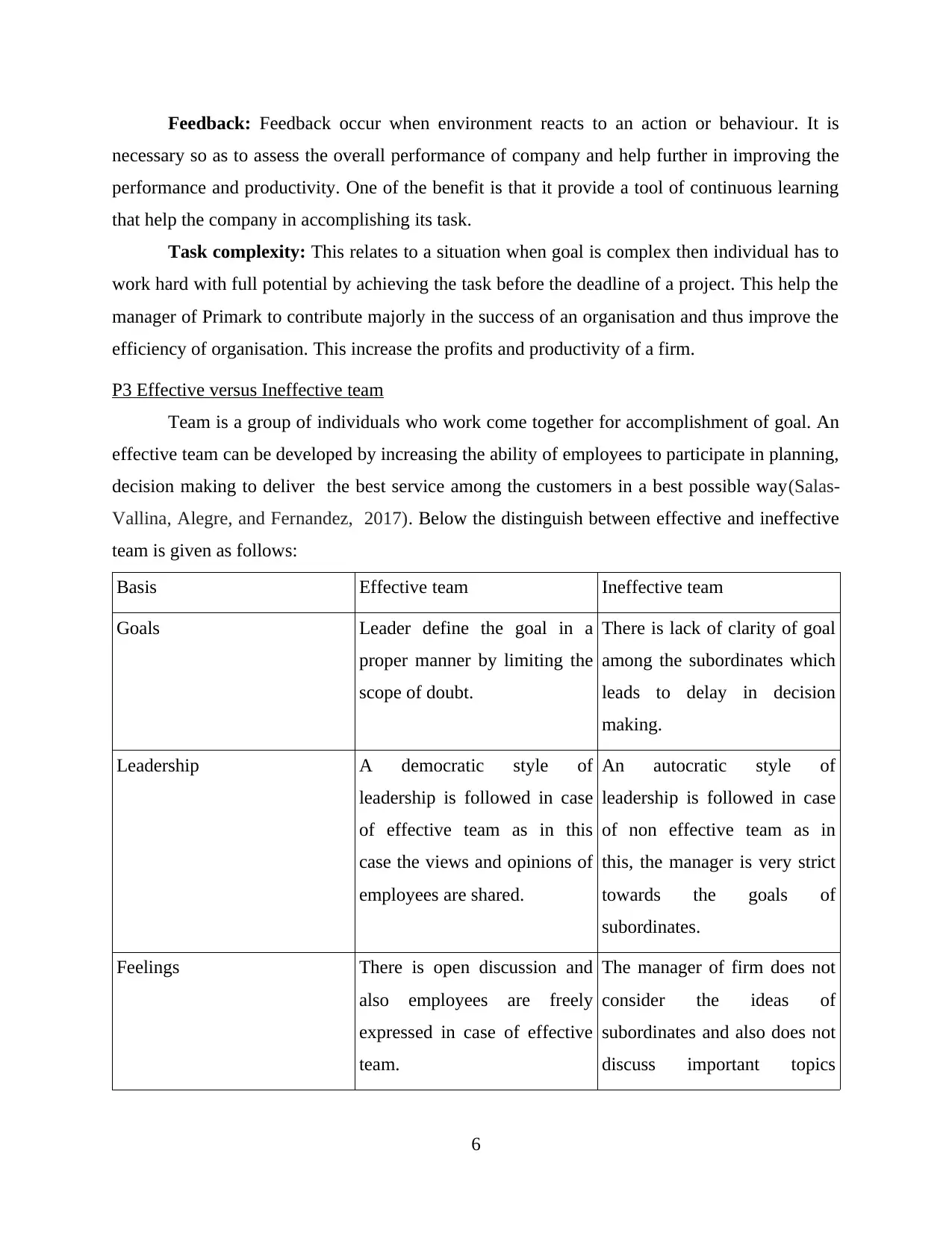
Feedback: Feedback occur when environment reacts to an action or behaviour. It is
necessary so as to assess the overall performance of company and help further in improving the
performance and productivity. One of the benefit is that it provide a tool of continuous learning
that help the company in accomplishing its task.
Task complexity: This relates to a situation when goal is complex then individual has to
work hard with full potential by achieving the task before the deadline of a project. This help the
manager of Primark to contribute majorly in the success of an organisation and thus improve the
efficiency of organisation. This increase the profits and productivity of a firm.
P3 Effective versus Ineffective team
Team is a group of individuals who work come together for accomplishment of goal. An
effective team can be developed by increasing the ability of employees to participate in planning,
decision making to deliver the best service among the customers in a best possible way(Salas-
Vallina, Alegre, and Fernandez, 2017). Below the distinguish between effective and ineffective
team is given as follows:
Basis Effective team Ineffective team
Goals Leader define the goal in a
proper manner by limiting the
scope of doubt.
There is lack of clarity of goal
among the subordinates which
leads to delay in decision
making.
Leadership A democratic style of
leadership is followed in case
of effective team as in this
case the views and opinions of
employees are shared.
An autocratic style of
leadership is followed in case
of non effective team as in
this, the manager is very strict
towards the goals of
subordinates.
Feelings There is open discussion and
also employees are freely
expressed in case of effective
team.
The manager of firm does not
consider the ideas of
subordinates and also does not
discuss important topics
6
necessary so as to assess the overall performance of company and help further in improving the
performance and productivity. One of the benefit is that it provide a tool of continuous learning
that help the company in accomplishing its task.
Task complexity: This relates to a situation when goal is complex then individual has to
work hard with full potential by achieving the task before the deadline of a project. This help the
manager of Primark to contribute majorly in the success of an organisation and thus improve the
efficiency of organisation. This increase the profits and productivity of a firm.
P3 Effective versus Ineffective team
Team is a group of individuals who work come together for accomplishment of goal. An
effective team can be developed by increasing the ability of employees to participate in planning,
decision making to deliver the best service among the customers in a best possible way(Salas-
Vallina, Alegre, and Fernandez, 2017). Below the distinguish between effective and ineffective
team is given as follows:
Basis Effective team Ineffective team
Goals Leader define the goal in a
proper manner by limiting the
scope of doubt.
There is lack of clarity of goal
among the subordinates which
leads to delay in decision
making.
Leadership A democratic style of
leadership is followed in case
of effective team as in this
case the views and opinions of
employees are shared.
An autocratic style of
leadership is followed in case
of non effective team as in
this, the manager is very strict
towards the goals of
subordinates.
Feelings There is open discussion and
also employees are freely
expressed in case of effective
team.
The manager of firm does not
consider the ideas of
subordinates and also does not
discuss important topics
6
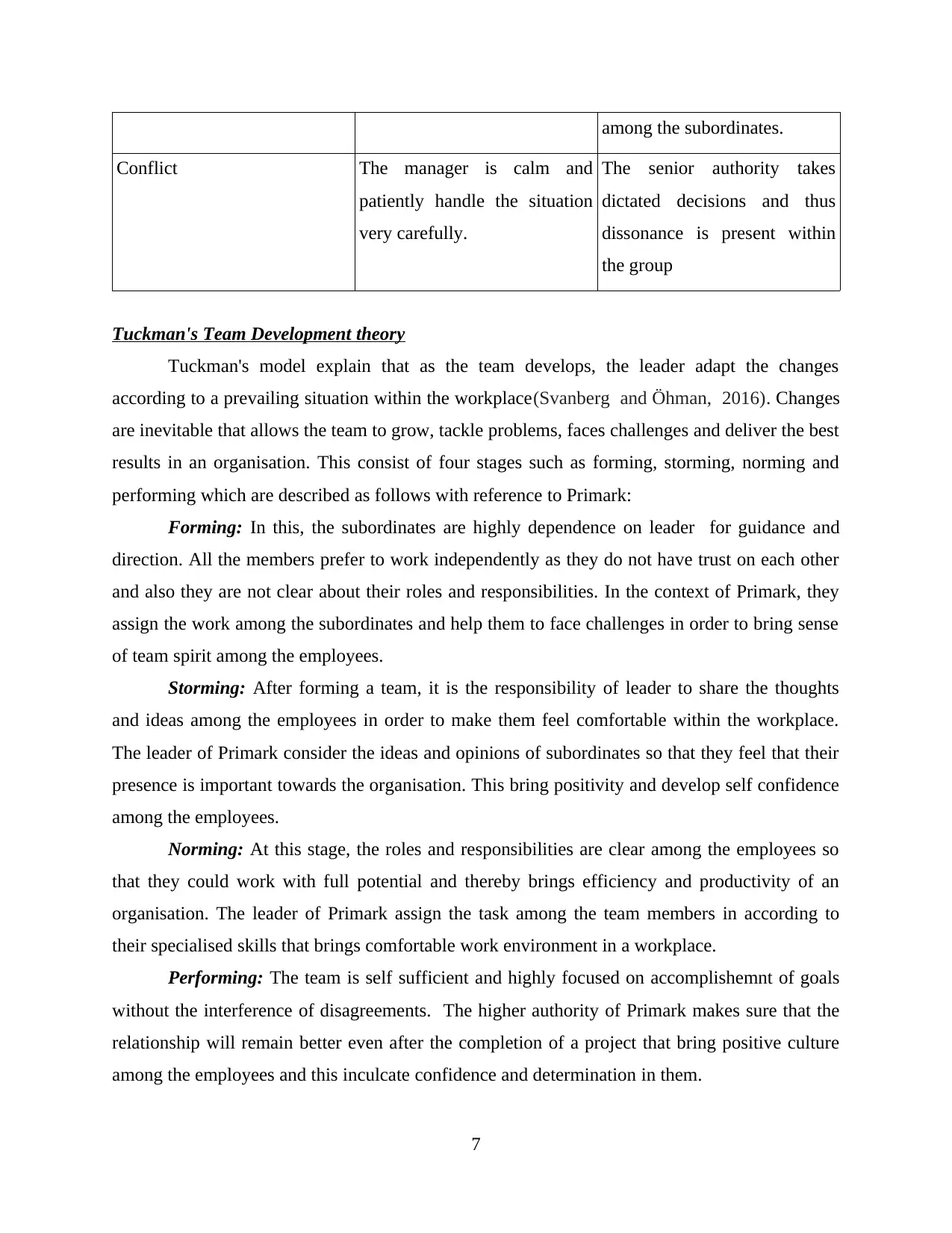
among the subordinates.
Conflict The manager is calm and
patiently handle the situation
very carefully.
The senior authority takes
dictated decisions and thus
dissonance is present within
the group
Tuckman's Team Development theory
Tuckman's model explain that as the team develops, the leader adapt the changes
according to a prevailing situation within the workplace(Svanberg and Öhman, 2016). Changes
are inevitable that allows the team to grow, tackle problems, faces challenges and deliver the best
results in an organisation. This consist of four stages such as forming, storming, norming and
performing which are described as follows with reference to Primark:
Forming: In this, the subordinates are highly dependence on leader for guidance and
direction. All the members prefer to work independently as they do not have trust on each other
and also they are not clear about their roles and responsibilities. In the context of Primark, they
assign the work among the subordinates and help them to face challenges in order to bring sense
of team spirit among the employees.
Storming: After forming a team, it is the responsibility of leader to share the thoughts
and ideas among the employees in order to make them feel comfortable within the workplace.
The leader of Primark consider the ideas and opinions of subordinates so that they feel that their
presence is important towards the organisation. This bring positivity and develop self confidence
among the employees.
Norming: At this stage, the roles and responsibilities are clear among the employees so
that they could work with full potential and thereby brings efficiency and productivity of an
organisation. The leader of Primark assign the task among the team members in according to
their specialised skills that brings comfortable work environment in a workplace.
Performing: The team is self sufficient and highly focused on accomplishemnt of goals
without the interference of disagreements. The higher authority of Primark makes sure that the
relationship will remain better even after the completion of a project that bring positive culture
among the employees and this inculcate confidence and determination in them.
7
Conflict The manager is calm and
patiently handle the situation
very carefully.
The senior authority takes
dictated decisions and thus
dissonance is present within
the group
Tuckman's Team Development theory
Tuckman's model explain that as the team develops, the leader adapt the changes
according to a prevailing situation within the workplace(Svanberg and Öhman, 2016). Changes
are inevitable that allows the team to grow, tackle problems, faces challenges and deliver the best
results in an organisation. This consist of four stages such as forming, storming, norming and
performing which are described as follows with reference to Primark:
Forming: In this, the subordinates are highly dependence on leader for guidance and
direction. All the members prefer to work independently as they do not have trust on each other
and also they are not clear about their roles and responsibilities. In the context of Primark, they
assign the work among the subordinates and help them to face challenges in order to bring sense
of team spirit among the employees.
Storming: After forming a team, it is the responsibility of leader to share the thoughts
and ideas among the employees in order to make them feel comfortable within the workplace.
The leader of Primark consider the ideas and opinions of subordinates so that they feel that their
presence is important towards the organisation. This bring positivity and develop self confidence
among the employees.
Norming: At this stage, the roles and responsibilities are clear among the employees so
that they could work with full potential and thereby brings efficiency and productivity of an
organisation. The leader of Primark assign the task among the team members in according to
their specialised skills that brings comfortable work environment in a workplace.
Performing: The team is self sufficient and highly focused on accomplishemnt of goals
without the interference of disagreements. The higher authority of Primark makes sure that the
relationship will remain better even after the completion of a project that bring positive culture
among the employees and this inculcate confidence and determination in them.
7
⊘ This is a preview!⊘
Do you want full access?
Subscribe today to unlock all pages.

Trusted by 1+ million students worldwide
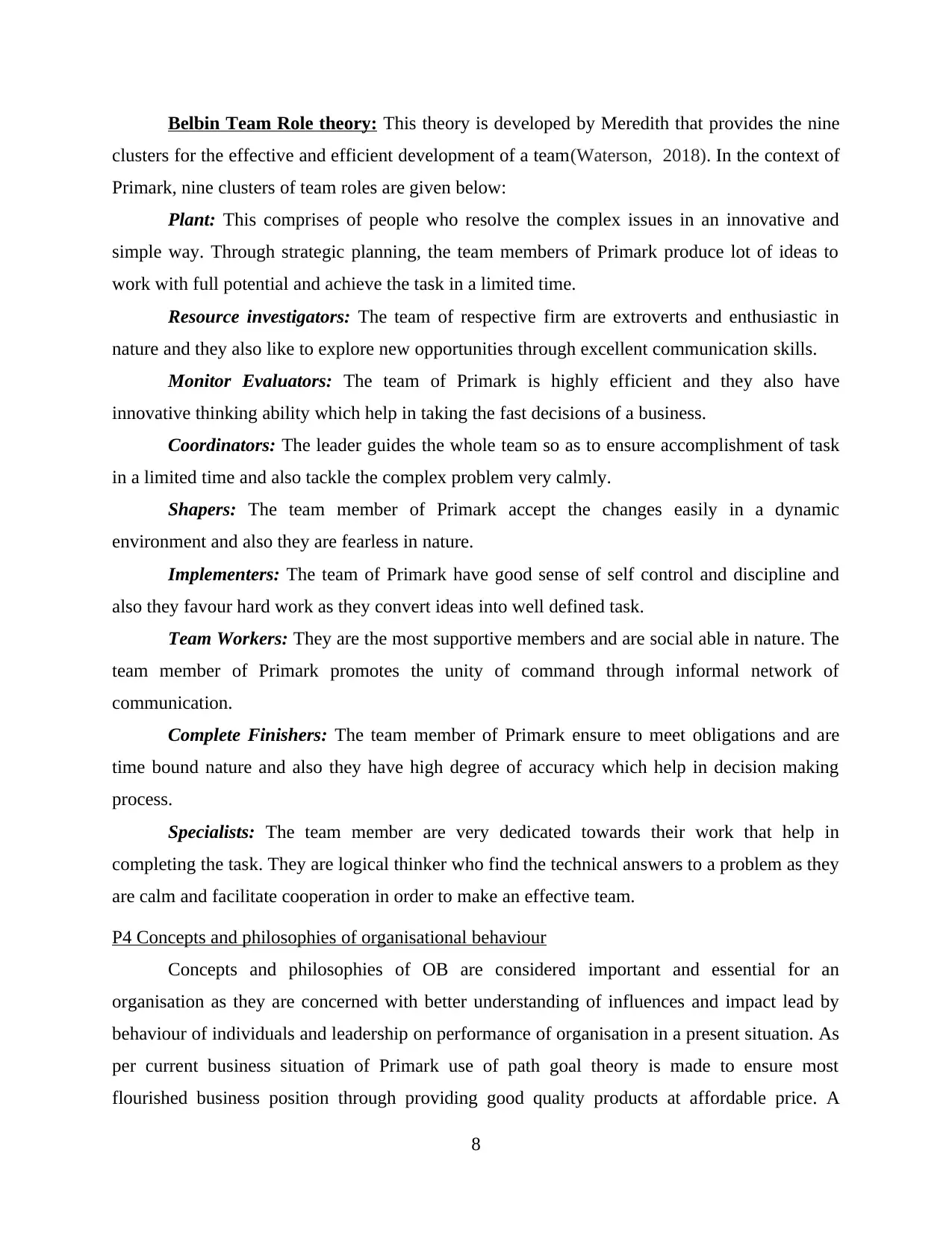
Belbin Team Role theory: This theory is developed by Meredith that provides the nine
clusters for the effective and efficient development of a team(Waterson, 2018). In the context of
Primark, nine clusters of team roles are given below:
Plant: This comprises of people who resolve the complex issues in an innovative and
simple way. Through strategic planning, the team members of Primark produce lot of ideas to
work with full potential and achieve the task in a limited time.
Resource investigators: The team of respective firm are extroverts and enthusiastic in
nature and they also like to explore new opportunities through excellent communication skills.
Monitor Evaluators: The team of Primark is highly efficient and they also have
innovative thinking ability which help in taking the fast decisions of a business.
Coordinators: The leader guides the whole team so as to ensure accomplishment of task
in a limited time and also tackle the complex problem very calmly.
Shapers: The team member of Primark accept the changes easily in a dynamic
environment and also they are fearless in nature.
Implementers: The team of Primark have good sense of self control and discipline and
also they favour hard work as they convert ideas into well defined task.
Team Workers: They are the most supportive members and are social able in nature. The
team member of Primark promotes the unity of command through informal network of
communication.
Complete Finishers: The team member of Primark ensure to meet obligations and are
time bound nature and also they have high degree of accuracy which help in decision making
process.
Specialists: The team member are very dedicated towards their work that help in
completing the task. They are logical thinker who find the technical answers to a problem as they
are calm and facilitate cooperation in order to make an effective team.
P4 Concepts and philosophies of organisational behaviour
Concepts and philosophies of OB are considered important and essential for an
organisation as they are concerned with better understanding of influences and impact lead by
behaviour of individuals and leadership on performance of organisation in a present situation. As
per current business situation of Primark use of path goal theory is made to ensure most
flourished business position through providing good quality products at affordable price. A
8
clusters for the effective and efficient development of a team(Waterson, 2018). In the context of
Primark, nine clusters of team roles are given below:
Plant: This comprises of people who resolve the complex issues in an innovative and
simple way. Through strategic planning, the team members of Primark produce lot of ideas to
work with full potential and achieve the task in a limited time.
Resource investigators: The team of respective firm are extroverts and enthusiastic in
nature and they also like to explore new opportunities through excellent communication skills.
Monitor Evaluators: The team of Primark is highly efficient and they also have
innovative thinking ability which help in taking the fast decisions of a business.
Coordinators: The leader guides the whole team so as to ensure accomplishment of task
in a limited time and also tackle the complex problem very calmly.
Shapers: The team member of Primark accept the changes easily in a dynamic
environment and also they are fearless in nature.
Implementers: The team of Primark have good sense of self control and discipline and
also they favour hard work as they convert ideas into well defined task.
Team Workers: They are the most supportive members and are social able in nature. The
team member of Primark promotes the unity of command through informal network of
communication.
Complete Finishers: The team member of Primark ensure to meet obligations and are
time bound nature and also they have high degree of accuracy which help in decision making
process.
Specialists: The team member are very dedicated towards their work that help in
completing the task. They are logical thinker who find the technical answers to a problem as they
are calm and facilitate cooperation in order to make an effective team.
P4 Concepts and philosophies of organisational behaviour
Concepts and philosophies of OB are considered important and essential for an
organisation as they are concerned with better understanding of influences and impact lead by
behaviour of individuals and leadership on performance of organisation in a present situation. As
per current business situation of Primark use of path goal theory is made to ensure most
flourished business position through providing good quality products at affordable price. A
8
Paraphrase This Document
Need a fresh take? Get an instant paraphrase of this document with our AI Paraphraser
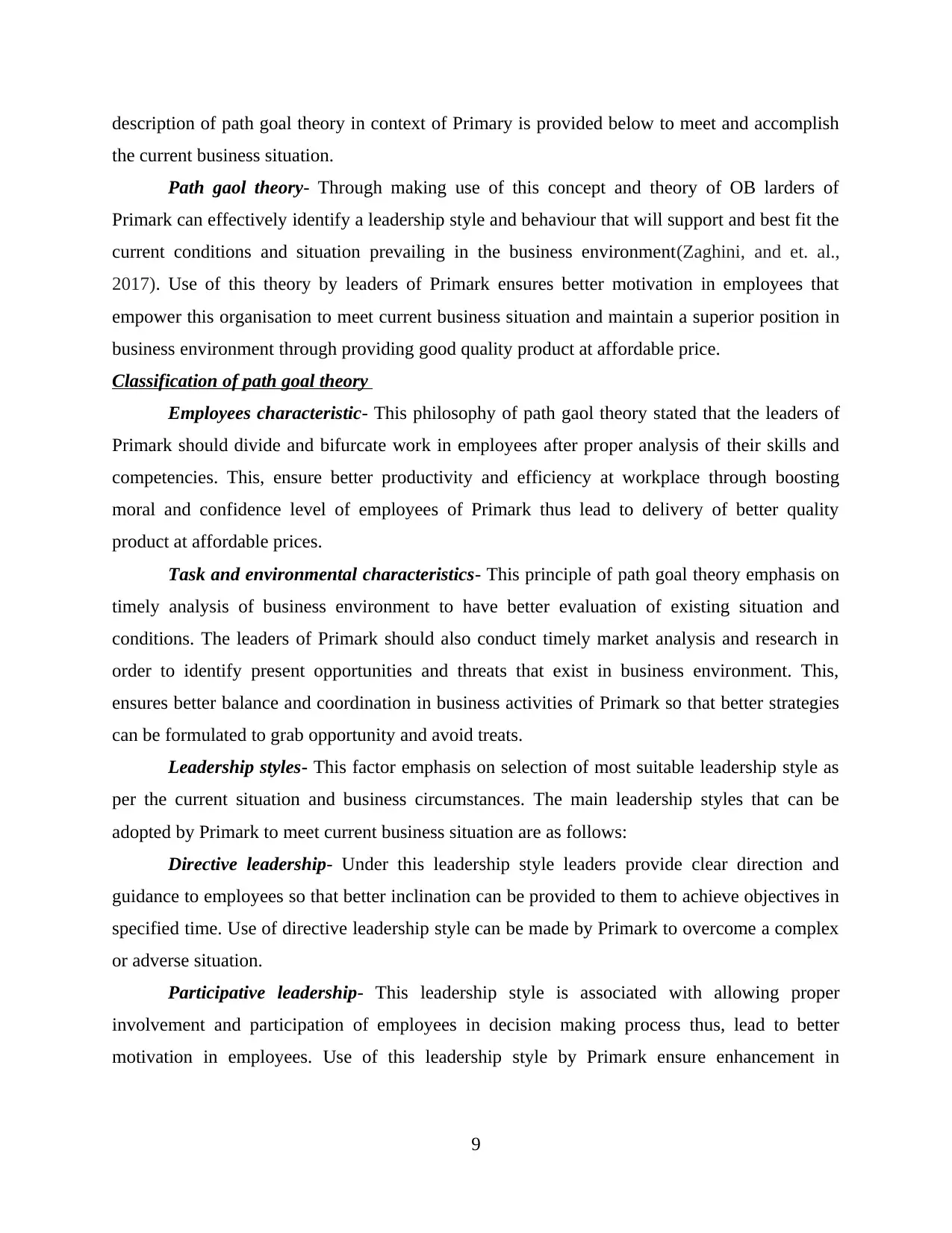
description of path goal theory in context of Primary is provided below to meet and accomplish
the current business situation.
Path gaol theory- Through making use of this concept and theory of OB larders of
Primark can effectively identify a leadership style and behaviour that will support and best fit the
current conditions and situation prevailing in the business environment(Zaghini, and et. al.,
2017). Use of this theory by leaders of Primark ensures better motivation in employees that
empower this organisation to meet current business situation and maintain a superior position in
business environment through providing good quality product at affordable price.
Classification of path goal theory
Employees characteristic- This philosophy of path gaol theory stated that the leaders of
Primark should divide and bifurcate work in employees after proper analysis of their skills and
competencies. This, ensure better productivity and efficiency at workplace through boosting
moral and confidence level of employees of Primark thus lead to delivery of better quality
product at affordable prices.
Task and environmental characteristics- This principle of path goal theory emphasis on
timely analysis of business environment to have better evaluation of existing situation and
conditions. The leaders of Primark should also conduct timely market analysis and research in
order to identify present opportunities and threats that exist in business environment. This,
ensures better balance and coordination in business activities of Primark so that better strategies
can be formulated to grab opportunity and avoid treats.
Leadership styles- This factor emphasis on selection of most suitable leadership style as
per the current situation and business circumstances. The main leadership styles that can be
adopted by Primark to meet current business situation are as follows:
Directive leadership- Under this leadership style leaders provide clear direction and
guidance to employees so that better inclination can be provided to them to achieve objectives in
specified time. Use of directive leadership style can be made by Primark to overcome a complex
or adverse situation.
Participative leadership- This leadership style is associated with allowing proper
involvement and participation of employees in decision making process thus, lead to better
motivation in employees. Use of this leadership style by Primark ensure enhancement in
9
the current business situation.
Path gaol theory- Through making use of this concept and theory of OB larders of
Primark can effectively identify a leadership style and behaviour that will support and best fit the
current conditions and situation prevailing in the business environment(Zaghini, and et. al.,
2017). Use of this theory by leaders of Primark ensures better motivation in employees that
empower this organisation to meet current business situation and maintain a superior position in
business environment through providing good quality product at affordable price.
Classification of path goal theory
Employees characteristic- This philosophy of path gaol theory stated that the leaders of
Primark should divide and bifurcate work in employees after proper analysis of their skills and
competencies. This, ensure better productivity and efficiency at workplace through boosting
moral and confidence level of employees of Primark thus lead to delivery of better quality
product at affordable prices.
Task and environmental characteristics- This principle of path goal theory emphasis on
timely analysis of business environment to have better evaluation of existing situation and
conditions. The leaders of Primark should also conduct timely market analysis and research in
order to identify present opportunities and threats that exist in business environment. This,
ensures better balance and coordination in business activities of Primark so that better strategies
can be formulated to grab opportunity and avoid treats.
Leadership styles- This factor emphasis on selection of most suitable leadership style as
per the current situation and business circumstances. The main leadership styles that can be
adopted by Primark to meet current business situation are as follows:
Directive leadership- Under this leadership style leaders provide clear direction and
guidance to employees so that better inclination can be provided to them to achieve objectives in
specified time. Use of directive leadership style can be made by Primark to overcome a complex
or adverse situation.
Participative leadership- This leadership style is associated with allowing proper
involvement and participation of employees in decision making process thus, lead to better
motivation in employees. Use of this leadership style by Primark ensure enhancement in
9
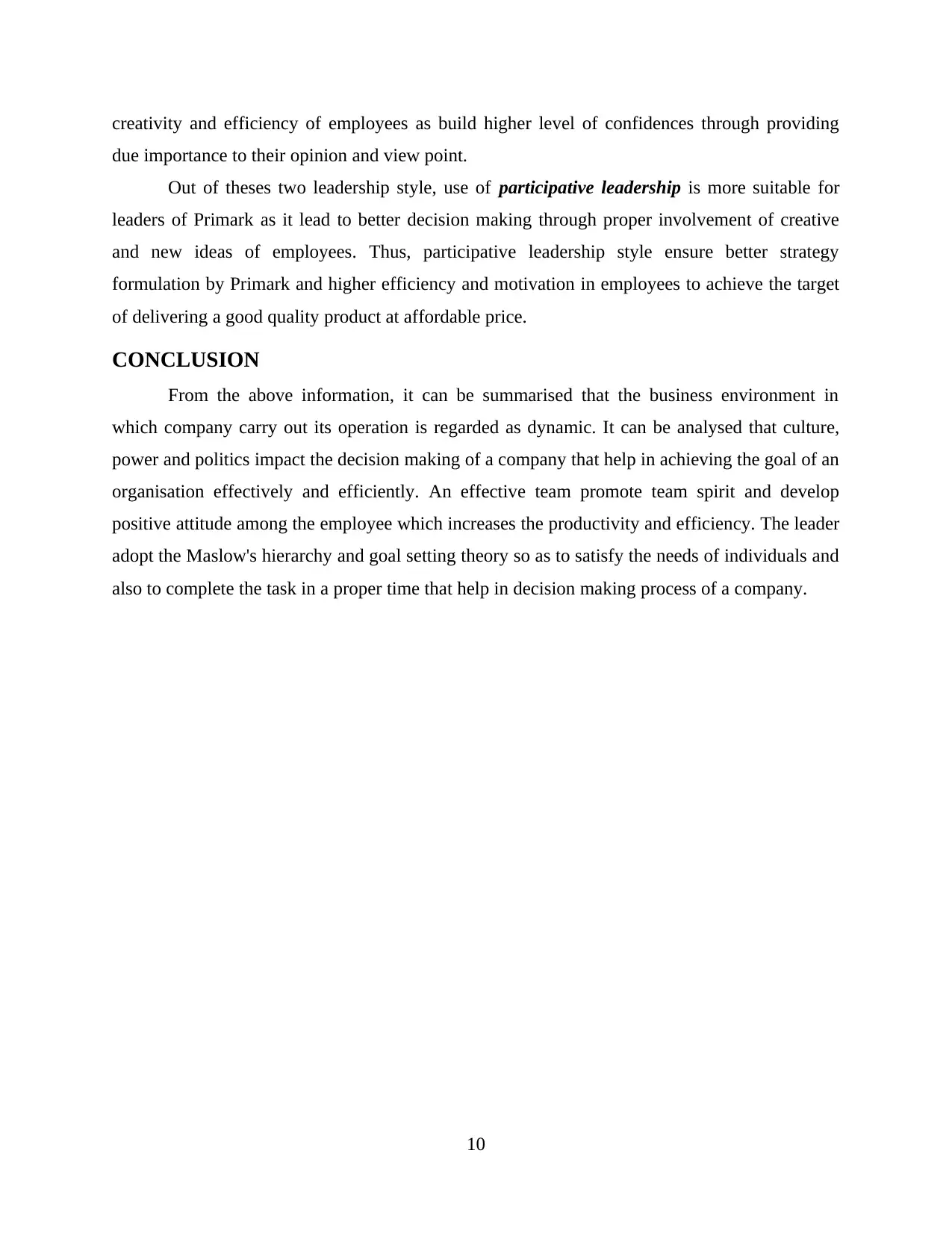
creativity and efficiency of employees as build higher level of confidences through providing
due importance to their opinion and view point.
Out of theses two leadership style, use of participative leadership is more suitable for
leaders of Primark as it lead to better decision making through proper involvement of creative
and new ideas of employees. Thus, participative leadership style ensure better strategy
formulation by Primark and higher efficiency and motivation in employees to achieve the target
of delivering a good quality product at affordable price.
CONCLUSION
From the above information, it can be summarised that the business environment in
which company carry out its operation is regarded as dynamic. It can be analysed that culture,
power and politics impact the decision making of a company that help in achieving the goal of an
organisation effectively and efficiently. An effective team promote team spirit and develop
positive attitude among the employee which increases the productivity and efficiency. The leader
adopt the Maslow's hierarchy and goal setting theory so as to satisfy the needs of individuals and
also to complete the task in a proper time that help in decision making process of a company.
10
due importance to their opinion and view point.
Out of theses two leadership style, use of participative leadership is more suitable for
leaders of Primark as it lead to better decision making through proper involvement of creative
and new ideas of employees. Thus, participative leadership style ensure better strategy
formulation by Primark and higher efficiency and motivation in employees to achieve the target
of delivering a good quality product at affordable price.
CONCLUSION
From the above information, it can be summarised that the business environment in
which company carry out its operation is regarded as dynamic. It can be analysed that culture,
power and politics impact the decision making of a company that help in achieving the goal of an
organisation effectively and efficiently. An effective team promote team spirit and develop
positive attitude among the employee which increases the productivity and efficiency. The leader
adopt the Maslow's hierarchy and goal setting theory so as to satisfy the needs of individuals and
also to complete the task in a proper time that help in decision making process of a company.
10
⊘ This is a preview!⊘
Do you want full access?
Subscribe today to unlock all pages.

Trusted by 1+ million students worldwide
1 out of 13
Related Documents
Your All-in-One AI-Powered Toolkit for Academic Success.
+13062052269
info@desklib.com
Available 24*7 on WhatsApp / Email
![[object Object]](/_next/static/media/star-bottom.7253800d.svg)
Unlock your academic potential
Copyright © 2020–2026 A2Z Services. All Rights Reserved. Developed and managed by ZUCOL.





